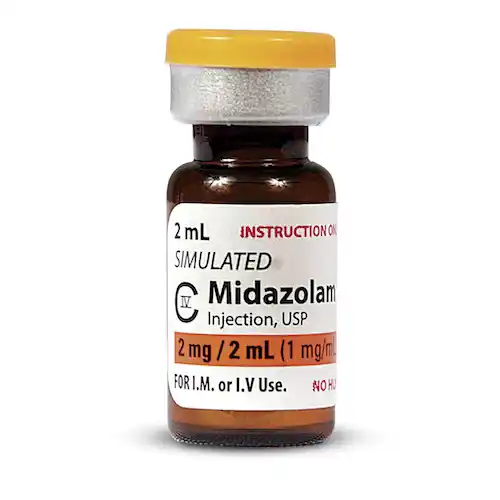How does IV sedation work?
IV sedation, also known as conscious sedation, works by administering sedative medications directly into the bloodstream through an intravenous line. Here is a step-by-step explanation of how IV sedation works:
-
Pre-Sedation Assessment
Before the procedure, a thorough assessment is conducted by the healthcare provider to evaluate the patient’s medical history, current health status, and any potential contraindications or risks associated with IV sedation.
-
Intravenous Line Placement
A small needle or catheter is inserted into a vein, typically in the patient’s arm or hand. This intravenous line serves as the pathway for delivering the sedative medications.
-
Medication Administration
Once the intravenous line is in place, the sedative medications are administered. The specific medications used may vary depending on the healthcare provider’s preference, the patient’s medical condition, and the type of procedure being performed. Commonly used medications include benzodiazepines, such as midazolam, which induce relaxation and reduce anxiety.
-
Sedative Effects
The sedative medications travel through the bloodstream and reach the brain, where they bind to specific receptors and enhance the activity of a neurotransmitter called gamma-aminobutyric acid (GABA). This results in a calming effect, promoting relaxation and reducing anxiety.
-
Deep Relaxation and Reduced Awareness
As the sedative takes effect, the patient enters a state of deep relaxation. While the patient remains conscious and responsive, their awareness of the dental procedure and surrounding environment is significantly reduced. This allows the patient to remain calm and comfortable during the procedure.
-
Pain Control and Amnesia Effect
In addition to inducing relaxation, IV sedation also provides pain control. The sedative medications used in IV sedation often possess analgesic properties, ensuring that patients experience minimal pain or discomfort during the dental procedure. Furthermore, IV sedation can create a temporary amnesia effect, resulting in limited recollection of the procedure for the patient.
-
Monitoring and Adjustments
Throughout the dental procedure, the patient’s vital signs, including heart rate, blood pressure, oxygen levels, and breathing, are closely monitored by trained healthcare professionals. This monitoring ensures the patient’s safety and allows for adjustments to the sedative dosage if necessary.
-
Gradual Recovery
Once the dental procedure is complete, the administration of the sedative medications is stopped. The effects of IV sedation gradually wear off, and the patient begins to regain full consciousness. However, it is common for patients to feel drowsy and disoriented after IV sedation, so a recovery period is usually provided before the patient is discharged.
It’s important to note that IV sedation should only be administered by trained professionals who are experienced in its administration and monitoring. The specific protocol and medications used may vary depending on the healthcare provider, the patient’s individual needs, and the nature of the procedure being performed.
What drugs are used in IV sedation?
Various drugs can be used in IV sedation depending on the specific needs of the patient and the procedure being performed. Here are some common medications used in IV sedation:
-
Benzodiazepines
Benzodiazepines are commonly used in IV sedation due to their sedative, anxiolytic (anti-anxiety), and amnesic properties. Midazolam is the most frequently used benzodiazepine in IV sedation for its rapid onset and short duration of action. Other benzodiazepines used include diazepam and lorazepam.
Midazolam, typically used in IV sedation dentistry -
Propofol
Propofol is a short-acting intravenous anesthetic that provides rapid sedation and amnesia. It is commonly used in IV sedation and general anesthesia for its fast onset of action and smooth recovery profile.
-
Barbiturates
Barbiturates such as thiopental and methohexital were previously used in IV sedation, but their use has decreased due to the availability of safer alternatives with fewer side effects.
-
Opioids
Opioids may be used in combination with other sedative medications to provide pain relief and enhance sedation. Commonly used opioids include fentanyl and morphine.
-
Antiemetics
Antiemetic medications like ondansetron or metoclopramide may be included in the IV sedation protocol to prevent nausea and vomiting during and after the procedure.
The specific combination and dosage of medications used in IV sedation can vary based on the patient’s medical history, age, weight, and the procedure being performed.
The selection of drugs is determined by the healthcare provider based on their training, experience, and the individual needs of the patient to ensure safety and optimal sedation outcomes.
The administration and monitoring of IV sedation should always be performed by qualified healthcare professionals who are trained in sedation techniques.
The Benefits of IV Sedation for Dental Implants: A Comfortable and Relaxing Experience
Undergoing dental implant surgery is a significant step towards restoring a confident smile and optimal oral health. However, for some patients, the anxiety and fear associated with dental procedures can pose a challenge.
That’s where IV sedation comes into play. Intravenous sedation, also known as IV sedation or conscious sedation, offers a range of benefits that can transform the dental implant experience into a comfortable and relaxing one.
In this comprehensive article, we will delve into the advantages of IV sedation for dental implant procedures, exploring how it enhances patient comfort and contributes to a positive outcome.
-
Enhanced Comfort and Relaxation
One of the primary benefits of IV sedation for dental implants is the profound comfort it provides to patients. IV sedation involves the administration of sedative medications directly into the bloodstream, inducing a state of deep relaxation.
As a result, patients feel calm, at ease, and largely unaware of the dental procedure taking place. The sedative properties of IV medications effectively minimize anxiety and fear, creating a more pleasant experience for patients who may otherwise find dental implant surgery daunting.
Example: Consider Sarah, a patient who had been delaying her dental implant procedure for years due to severe dental anxiety. After thorough consultation with her dentist, it was determined that IV sedation would be the best option for her. On the day of the surgery, Sarah arrived at the dental office feeling apprehensive. However, once the IV sedation was administered, she quickly entered a relaxed state. Throughout the dental implant procedure, Sarah was able to remain calm and comfortable, with minimal awareness of the process. IV sedation allowed her to overcome her dental anxiety and successfully complete the surgery, leading to a positive transformation in her oral health.
-
Anxiety Reduction and Fear Management
Dental implant surgery can trigger significant anxiety in patients, particularly those with dental phobia or a history of traumatic dental experiences. IV sedation acts as a powerful tool in managing anxiety and fear associated with dental procedures.
By inducing a state of relaxation, IV sedation minimizes psychological distress and helps patients maintain a sense of calm throughout the dental implant surgery. As a result, patients can approach the procedure with increased confidence and reduced fear.
Example: Michael had always been fearful of dental treatments, and the idea of undergoing dental implant surgery was particularly daunting for him. However, with the recommendation of his dentist, he opted for IV sedation to alleviate his anxiety. The sedative effects of IV medications allowed Michael to enter a tranquil state, significantly reducing his fear and allowing the dental team to perform the necessary implant procedure without complications. By combining IV sedation with the expertise of his dentist, Michael was able to overcome his dental fears and achieve a successful dental implant outcome.
-
Pain Control and Discomfort Management
While dental implant surgery is generally well-tolerated, some patients may experience discomfort or sensitivity during the procedure. IV sedation provides effective pain control, contributing to a more comfortable experience.
The medications administered through the intravenous line not only induce relaxation but also possess analgesic properties. This ensures that patients remain comfortable and experience minimal pain throughout the dental implant surgery.
Example: Emily had several missing teeth and decided to undergo dental implant surgery to restore her smile. However, she was concerned about potential pain during the procedure. Her dentist recommended IV sedation to enhance her comfort. During the surgery, Emily remained in a relaxed state, and the pain control provided by IV sedation ensured that she experienced minimal discomfort. Thanks to the combination of dental expertise and IV sedation, Emily’s dental implant surgery was successfully completed without significant pain, allowing her to embark on her journey towards a confident and functional smile.
-
Reduced Time Perception and Temporary Amnesia
Another remarkable aspect of IV sedation for dental implant procedures is its ability to alter the patient’s perception of time and create a temporary amnesia effect. Patients often report feeling as though the procedure took a shorter amount of time than it actually did.
This is particularly beneficial for lengthy or complex implant surgeries, as it allows patients to feel as though the procedure was swift and hassle-free. Additionally, the temporary amnesia effect ensures that patients have limited recollection of the procedure, reducing post-operative anxiety or traumatic memories associated with the dental implant surgery.
Example: John required a full-arch implant restoration, a procedure that can be time-consuming. To ensure his comfort and minimize any potential anxiety, his dentist recommended IV sedation. As the sedative medications were administered, John entered a relaxed state and experienced an altered perception of time. What would have felt like a lengthy procedure to him under normal circumstances seemed much shorter due to the effects of IV sedation. Moreover, the temporary amnesia effect allowed John to recover without vivid memories of the procedure, enabling a smoother post-operative experience.
The Takeaway
IV sedation offers numerous advantages for patients undergoing dental implant surgery. By enhancing comfort, reducing anxiety, providing effective pain control, and altering time perception, IV sedation transforms the dental implant experience into a more relaxed and positive one.
The example scenarios of Sarah, Michael, Emily, and John illustrate how IV sedation can make a significant difference in patients’ lives, allowing them to overcome their fears and achieve successful dental implant outcomes.
If you are considering dental implants, consult with your dentist to explore the possibility of IV sedation and embark on your journey towards a restored smile with confidence and comfort.






